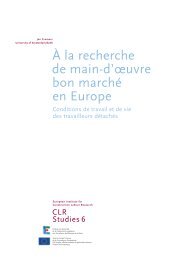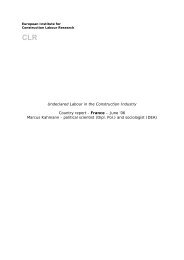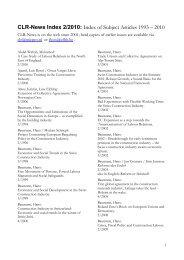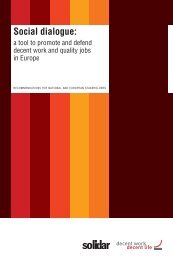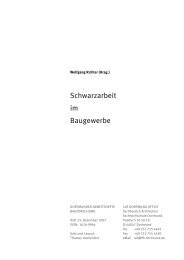Japan – what can we learn? - Construction Labour Research
Japan – what can we learn? - Construction Labour Research
Japan – what can we learn? - Construction Labour Research
You also want an ePaper? Increase the reach of your titles
YUMPU automatically turns print PDFs into web optimized ePapers that Google loves.
the company's business situation as <strong>we</strong>ll as matters involvingemployment and working conditions. The system operates at 80.5% ofunionised enterprises and at 15% of non-unionised companies("Survey on Management-Management Communication," Ministry ofHealth, <strong>Labour</strong> and Welfare, 2004).The joint consultation system is not based on any law. Voluntarily runby agreement bet<strong>we</strong>en representatives and management at individualenterprises, the system has various versions. The range of topics takenup as <strong>we</strong>ll as the degree of the union's influence also differs greatlycompany-to-company. Generally, the consultation at unionisedenterprises has a more formal character, deals with a broader range oftopics and ensures the union's stronger say than at non-union firms.The agenda at the joint consultation is wide-ranging. It is of specialnote that in more than half of cases those business matters which areusually considered management prerogatives such as basic businessstrategies, production and market plans, company's organizationalstructure, and equipment investment are topics of consultation.How far the voice of the labour side is heard again differs according tothe nature of the matter discussed. Roughly there are four modalitiesof consultation with different degrees of the union's participatorystrength: (1) management only reports on and explains the companypolicy, (2) management listens to the union but decides by itself, (3)management endeavours to come to accord with the union, and (4)management requires the union's consent before it takes a decision.On matters pertaining to wages, working time, and other basicworking conditions as <strong>we</strong>ll as job transfer, transfer to other firms,dismissals and other matters related to employment, cases requiringprior consultation and/or consent of the union are more frequent thanon other matters (See Table 1).Though the joint consultation system plays a signifi<strong>can</strong>t role inlubricating communication bet<strong>we</strong>en the union and management, itdoes not guarantee the unions a large enough say in crucial matters. Itis therefore necessary that the unions strengthen their influence ondecision-making by increasing consultation and/or prior consentrequiringitems of consultation. The <strong>Japan</strong>ese Federation of Textile,Garment, Chemical, Mer<strong>can</strong>tile, Food and Allied Industries Workers'Unions (ZENSEN), <strong>Japan</strong> Federation of and Steel Workers' Unions(TEKKO ROREN), <strong>Japan</strong>ese Electrical Electronic & InformationCLR News No 2/200655




